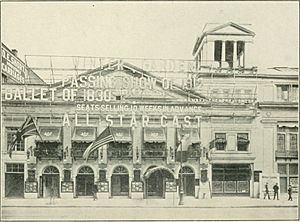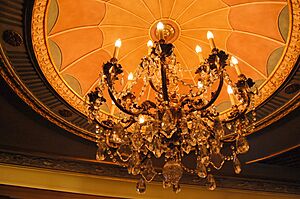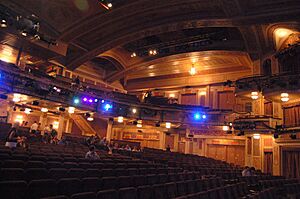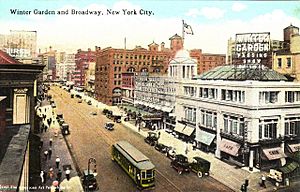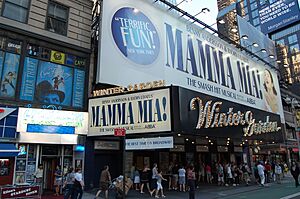Winter Garden Theatre facts for kids
|
Cadillac Winter Garden Theatre
|
|
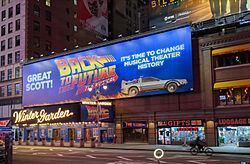 |
|
| Address | 1634 Broadway Manhattan, New York United States |
|---|---|
| Coordinates | 40°45′42″N 73°59′01″W / 40.76167°N 73.98361°W |
| Owner | Shubert Organization |
| Type | Broadway |
| Capacity | 1,600 |
| Construction | |
| Opened | 1896 (original structure) March 20, 1911 (theatre) |
| Rebuilt | 1922–1923 |
| Years active | 1911–1928, 1933–1945, 1948–present |
| Architect | William Albert Swasey (original theater) Herbert J. Krapp (rebuild) |
| Designated | January 5, 1988 |
| Reference no. | 1387 |
The Winter Garden Theatre is a famous Broadway theatre located at 1634 Broadway in New York City. It first opened as a theater in 1911. Because of its large stage and seating area, it's a popular choice for big, spectacular musicals. The theater can hold 1,600 people and is run by The Shubert Organization.
What makes the Winter Garden special is its history. Before it was a theater, the building was the American Horse Exchange, a place where horses were sold. Architect William Albert Swasey first turned it into a theater. Later, in 1922, another architect named Herbert J. Krapp completely redesigned it into the theater we see today.
The inside of the theater is decorated in a classic style called Adam style, with detailed patterns on the walls and ceiling. The auditorium has a main orchestra level and a large balcony. The theater has hosted some of Broadway's most famous shows, including the long-running musicals Cats and Mamma Mia!. The beautiful interior is so important that it's protected as a New York City landmark.
Contents
From Horse Market to Theater
The Winter Garden Theatre is located in Midtown Manhattan's Theater District, near Times Square. It sits on a large piece of land between Broadway and Seventh Avenue.
The American Horse Exchange
In the late 1800s, Times Square was called Longacre Square and was a center for the horse and carriage business. The building that is now the Winter Garden was originally the American Horse Exchange, built by William K. Vanderbilt. It was a place where high-quality horses were bought and sold.
The first exchange building was built in 1881. It had a huge covered ring for showing the horses. In 1896, a fire destroyed the building, but it was quickly rebuilt. The new building had a brick front with large arched windows. This is the structure that was later turned into the Winter Garden Theatre.
Designing the Theater
In 1911, the Shubert family, who were major theater owners, leased the Horse Exchange building. They hired architect William Albert Swasey to transform it into a grand theater. A decade later, in 1922, it was completely remodeled by Herbert J. Krapp.
Outside of the Theater
The original entrance on Broadway had five large arches and stone columns. Today, the front of the theater is covered with huge, bright billboards that advertise the current show. These billboards have been a feature of the theater since the 1930s.
The building has many exits, which made it one of the safest theaters of its time. A small part of the old Horse Exchange wall could be seen on the Seventh Avenue side until the 1990s.
Inside the Theater
The entrance on Broadway leads to a ticket lobby and then into a beautiful inner lobby. The walls and ceiling are decorated with elegant patterns in the Adam style. Bronze and glass doors lead from the lobby into the main auditorium.
The auditorium is very wide and is decorated with detailed plaster designs. It has a main orchestra level and one large balcony. There are also special seating areas called boxes on the side walls, arranged in two levels. The theater can seat about 1,600 people.
Seating and Stage
The seats on the orchestra and balcony levels are sloped, or raked, so everyone can see the stage. The front of the balcony has a curved railing decorated with ribbons and leaf patterns.
The stage is framed by a large arch called a proscenium. This arch is decorated with figures and patterns. Above the arch is a large painted panel called "The Shepherd's Dream," which shows figures dancing and playing music in a forest.
When the theater first opened, it had a special runway that extended from the stage out over the audience. This allowed performers to get very close to the crowd. The runway was removed during the 1922 renovation to make room for more seats.
History of the Theater
The Winter Garden Theatre opened during a time when the theater district was moving to the area now known as Times Square. It was developed by the Shubert brothers, who became very powerful in the American theater world.
Early Years and Al Jolson
The theater opened on March 20, 1911. The first show was a musical that introduced a singer and actor who would become a huge star: Al Jolson. Jolson became the main attraction at the Winter Garden, and his exciting performances made the theater famous.
The theater became known for its musical revues, which were shows with a mix of songs, dances, and comedy sketches. One popular series was The Passing Show, which ran almost every year from 1912 to 1924. These shows featured many famous performers, including Fred and Adele Astaire, Marilyn Miller, and Ed Wynn.
Renovations and Movies
In 1922, the theater closed for a major renovation. The goal was to make the space feel more intimate. The ceiling was lowered, the stage opening was made smaller, and the decorations were updated to a gold and white color scheme.
From 1928 to 1933, the Winter Garden was taken over by Warner Bros. and used as a movie theater. It showed some of the first movies with sound, including The Singing Fool starring Al Jolson. It briefly became a movie theater again from 1945 to 1948.
Famous Shows and Stars
After returning to live theater, the Winter Garden hosted many famous shows. In the 1930s and 1940s, it was home to the Ziegfeld Follies, another famous revue series. These shows featured stars like Bob Hope and Gypsy Rose Lee.
The 1950s brought the premiere of one of the most famous musicals of all time, West Side Story (1957). The 1960s saw two more massive hits: Funny Girl (1964), starring Barbra Streisand, and Mame (1966), starring Angela Lansbury.
The Cats Era
In 1982, the theater was completely transformed for the musical Cats. The inside was gutted and redesigned to look like a giant junkyard to fit the show's theme. The walls and even the outside billboard were painted black.
Cats opened on October 7, 1982, and became a worldwide phenomenon. It ran for almost 18 years, closing in 2000 after 7,485 performances. For a long time, it was the longest-running show in Broadway history.
21st Century Hits
After Cats closed, the theater was restored to its classic 1920s look. The next big hit was Mamma Mia!, a musical based on the songs of the group ABBA. It opened in 2001 and ran for 12 years before moving to another theater.
More recent hits include School of Rock (2015) and Beetlejuice (2019). In 2020, all Broadway theaters had to close because of the COVID-19 pandemic. The Winter Garden reopened in late 2021 with a popular revival of The Music Man.
Back to the Future: The Musical opened in August 2023 and closed in January 2025. It was followed by a play adaptation of the film Good Night, and Good Luck starring George Clooney, which opened in April 2025. In August 2025, a revival of Mamma Mia! opened at the theater.
Notable Productions
Here are some of the famous shows that have played at the Winter Garden Theatre.
| Opening year | Name | Refs. |
|---|---|---|
| 1911 | La Belle Paree | |
| 1912–1924 | The Passing Show | |
| 1918 | Sinbad | |
| 1934 | Ziegfeld Follies of 1934 | |
| 1936 | Ziegfeld Follies of 1936 | |
| 1941 | Sons o' Fun | |
| 1943 | Ziegfeld Follies of 1943 | |
| 1953 | Wonderful Town | |
| 1954 | Peter Pan | |
| 1957 | West Side Story | |
| 1960 | The Unsinkable Molly Brown | |
| 1964 | Funny Girl | |
| 1966 | Mame | |
| 1971 | Follies | |
| 1974 | Gypsy | |
| 1977 | Beatlemania | |
| 1980 | 42nd Street | |
| 1982 | Cats | |
| 2001 | Mamma Mia! | |
| 2014 | Rocky the Musical | |
| 2015 | School of Rock | |
| 2019 | Beetlejuice | |
| 2022 | The Music Man | |
| 2023 | Back to the Future: The Musical | |
| 2025 | Good Night, and Good Luck | |
| 2025 | Mamma Mia! |
See also
 In Spanish: Winter Garden Theatre para niños
In Spanish: Winter Garden Theatre para niños
- List of Broadway theaters
- List of New York City Designated Landmarks in Manhattan from 14th to 59th Streets
 | Jewel Prestage |
 | Ella Baker |
 | Fannie Lou Hamer |


